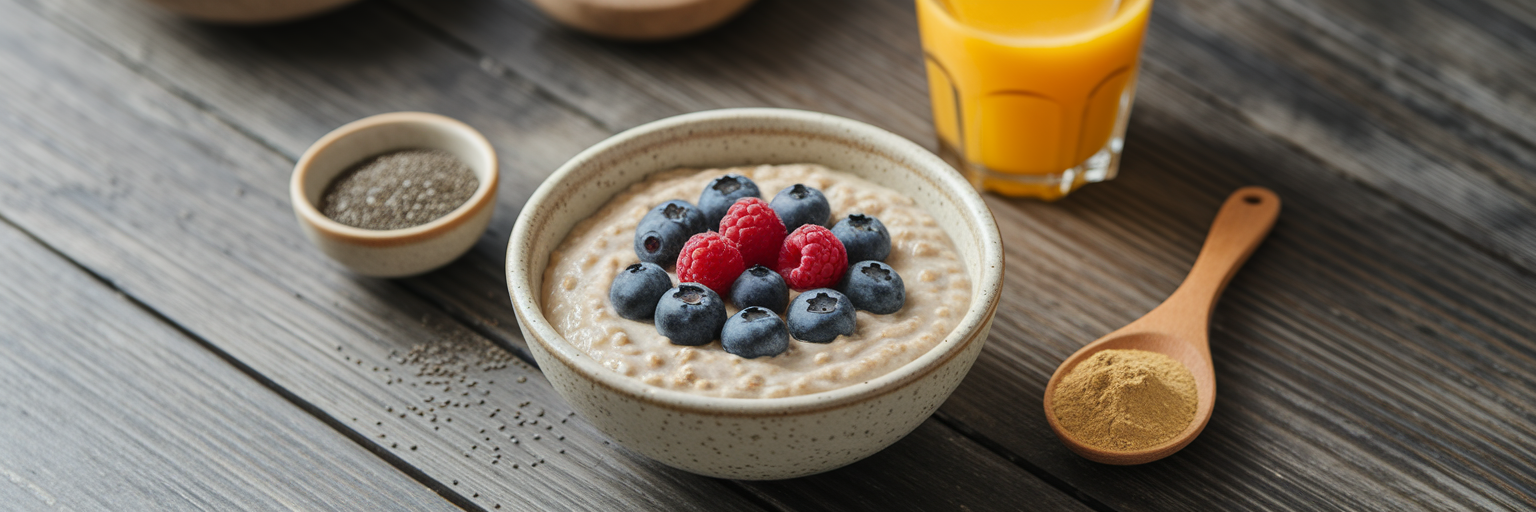We’ve all been there. You finish a great workout, mix up a protein shake to help your muscles recover, and then it hits you: that uncomfortable, heavy feeling of bloating. You wanted the benefits of protein, but instead, you got digestive distress. It’s a common frustration that leaves many people wondering if protein supplements are even worth it.
The Common Problem with Protein Powders
That post-shake discomfort isn’t just in your head. For many, it’s a direct result of what’s inside traditional, animal-based protein powders. The primary culprit is often whey and casein protein, both derived from milk. These proteins contain lactose, a type of sugar that a large number of adults have difficulty digesting. When your body can’t break down lactose properly, it can lead to gas, cramping, and that all-too-familiar bloat.
But it’s not just about the lactose. Many protein powders are packed with additives that can wreak havoc on your gut. Artificial sweeteners like sucralose and aspartame, along with sugar alcohols such as erythritol or xylitol, are frequently added to improve taste without adding calories. While they might seem harmless, these ingredients can disrupt the delicate balance of your gut microbiome, the community of beneficial bacteria living in your digestive system.
Another piece of the puzzle involves something called FODMAPs. This acronym stands for Fermentable Oligosaccharides, Disaccharides, Monosaccharides, and Polyols. In simple terms, they are types of carbohydrates that can be poorly absorbed in the small intestine. For people with sensitive digestive systems, these compounds can ferment in the gut, drawing in water and producing gas. This is a key factor in how to prevent protein shake bloating, as many common ingredients in supplements are high in FODMAPs. Understanding these triggers is the first step toward finding a protein that works with your body, not against it.
How Plant Proteins Offer a Gut-Friendly Solution

After understanding the common causes of digestive upset, it’s natural to look for a better alternative. This is where plant-based proteins come in as a gentle, effective solution. Their biggest immediate advantage is simple: they are completely free of lactose. By choosing a plant source, you sidestep the primary reason whey and casein cause bloating for so many people.
But the benefits go far beyond just what they lack. Plant proteins contain something animal-based proteins have none of: dietary fiber. This isn't just filler; the fiber in ingredients like pea, hemp, and brown rice acts as a prebiotic. Think of prebiotics as the fertilizer for your gut garden. They provide food for the beneficial bacteria that live in your digestive tract, helping them thrive. A well-nourished microbiome is essential for smooth digestion, a strong immune system, and overall wellness.
This creates a powerful synergy for plant based protein gut health. While you’re fueling your muscles with high-quality protein, you’re also actively supporting your digestive system with prebiotics. This proactive approach helps maintain a healthy gut environment, which naturally leads to less bloating and more comfortable digestion. Instead of just avoiding a problem, you’re contributing to a long-term solution for a happier gut.
Incorporating these proteins into your diet can be both easy and delicious. It’s not just about shakes; you can mix them into oatmeal, blend them into smoothies, or even bake with them. For some creative ideas to get you started, you can explore some of our easy vegan protein recipes that you’ll genuinely enjoy.
Choosing the Best Vegan Protein for Your Stomach
Once you’re ready to make the switch, picking the right vegan protein can feel overwhelming with so many options available. The key is to become a savvy label reader and know what to look for. Here are a few steps to guide you toward a powder that will be kind to your stomach.
- Look for a simple ingredient list. The best formulas don’t need a long list of fillers, gums, or artificial additives. Prioritize powders with short, recognizable ingredient lists. Steer clear of artificial sweeteners and sugar alcohols, which, as we've discussed, can be major triggers for digestive issues.
- Understand the protein source. Different plants offer different benefits. Finding the right one often comes down to personal tolerance and your wellness goals.
| Protein Source | Key Digestive Benefit | Best For | Things to Note |
|---|---|---|---|
| Pea Protein | Low in FODMAPs, hypoallergenic | Sensitive stomachs, muscle building | Often blended to complete amino acid profile |
| Brown Rice Protein | Hypoallergenic, gentle on the gut | Those with soy or nut allergies | Can have a slightly gritty texture if not well-milled |
| Hemp Protein | Rich in fiber and healthy fats | Boosting fiber intake, overall wellness | Has a distinct, earthy flavor |
| Soy Protein | Complete amino acid profile | A cost-effective, complete protein source | Some find soy isolates can cause bloating; check personal tolerance |
This table offers a general guide. Individual tolerance can vary, so it's always best to listen to your body when trying a new protein source.
- Check for added digestive support. Some high-quality powders include beneficial extras like digestive enzymes (such as protease or amylase) to help your body break down the protein more efficiently. Others might contain probiotics, which are live beneficial bacteria that further support a healthy gut microbiome.
- Consider the processing method. A truly digestible vegan protein powder might be sprouted or fermented. These processes help break down anti-nutrients like phytic acid, which can sometimes interfere with mineral absorption and digestion, making the protein even easier on your system. Many gut-friendly powders are also formulated to be low in FODMAPs, a concept developed by researchers at Monash University to help manage digestive sensitivities.
To see what high-quality formulas look like, you can review some of the best protein powders we’ve curated that prioritize clean ingredients and digestive comfort.
Smart Ways to Add Vegan Protein to Your Diet

Finding the right protein powder is half the battle; the other half is incorporating it into your routine in a way that feels good. If you have a sensitive system, how and when you consume your protein can make a big difference. Here are some smart tips to ensure a smooth, bloat-free experience.
- Think beyond the shake. While a quick shake is convenient, mixing protein powder into food can make it even easier to digest. Try stirring a scoop into your morning oatmeal, a bowl of dairy-free yogurt, or even pancake batter for a protein-packed breakfast.
- Build a gut-friendly smoothie. If you love smoothies, enhance them with ingredients known for their digestive benefits. Ginger is excellent for soothing the stomach, while pineapple contains bromelain, a natural digestive enzyme. Blending your powder with these ingredients can create a powerful, gut-happy combination.
- Start low and go slow. If you’re new to vegan protein or high-fiber supplements, don’t start with a huge serving. Begin with half a scoop to allow your digestive system to adjust to the increase in fiber. You can gradually work your way up to a full serving as your body gets accustomed to it.
- Don't drink it on an empty stomach. Chugging a large protein shake first thing in the morning on an empty stomach can sometimes be a shock to the system. Try having it with a small snack, like a banana or a handful of nuts, to slow down absorption and aid digestion. This is one of the simplest ways to find the best protein powder for sensitive stomachs that works for you.
For more creative ways to use your protein powder and other wellness inspiration, feel free to explore the tips and recipes on our blog.
A Holistic Approach to a Happy Gut
While choosing the right protein powder is a fantastic step, it’s important to remember that it’s a “supplement” for a reason. It’s designed to complement, not replace, a diet rich in whole foods. For a truly happy gut, think about creating a synergistic effect. Pair your protein smoothie with other gut-loving foods throughout the day, like high-fiber grains, fermented foods like kimchi or dairy-free yogurt, and a colorful array of vegetables.
Hydration is also incredibly important. Water is essential for helping dietary fiber do its job effectively. Without enough water, fiber can actually contribute to digestive sluggishness, so be sure to drink plenty of fluids throughout the day, especially when you increase your protein and fiber intake.
Ultimately, listening to your body is the most important part of this process. Pay attention to how you feel and adjust accordingly. What are your favorite gut-friendly recipes? Share them in the comments below!
Ready to find a vegan protein powder no bloating experience? Explore our collection of clean, plant-based options designed with your digestive comfort in mind.



